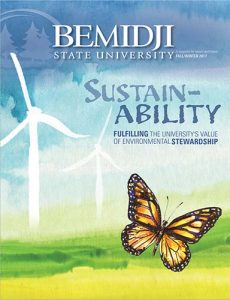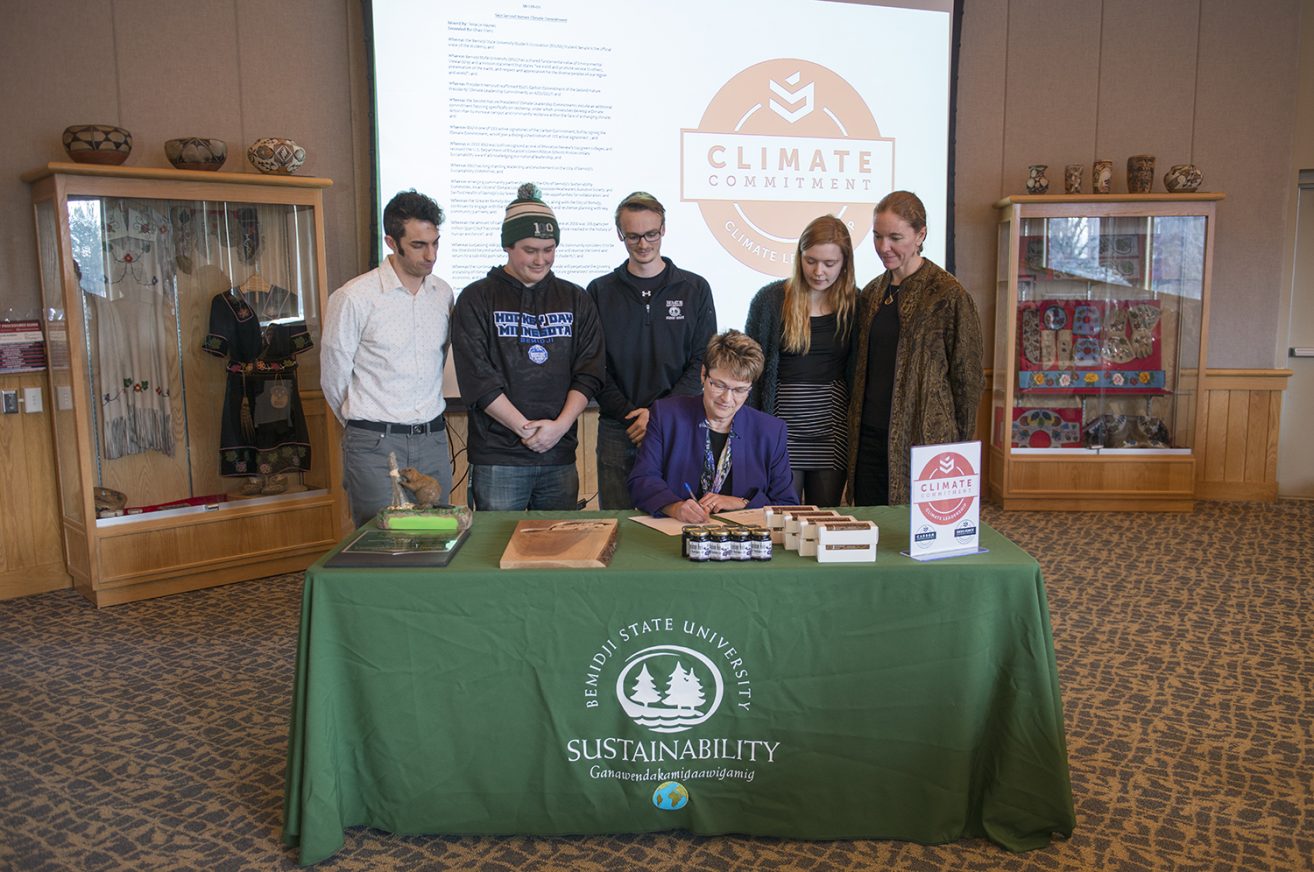
sustainability project manager, Connor Newby, Student Senate president, Corrie Stockman, Student Senate vice president, Anna Hayes, student senator and Sustainability Office employee, and Erika Bailey-Johnson, sustainability coordinator, look on.
Indispensable Stewards
|
As part of the ongoing recognition of Bemidji State University’s centennial, BSU’s Sustainability Office celebrated 10 years of leadership, stewardship, education and advocacy for our environment.
Jordan Lutz, sustainability project manager, said the Sustainability Office has been an inevitable evolution for a campus where environmental responsibility is a deep-rooted value.
“Though the Sustainability Office is celebrating its 10th year on campus, sustainability efforts precede the office itself by many years,” he said. “To me, 10 years of sustainability signifies the continuation of foundational work completed by many individuals who established a legacy of higher environmental standards at Bemidji State.”
Created in 2008, the Sustainability Office began with funds from a student-driven Green Fee, a $5-per-semester fee charged to all students that funds sustainability projects on campus. Shortly after, Erika Bailey-Johnson was hired as the university’s first sustainability coordinator. She started the office as its lone employee with one student worker, a team that has grown to now include two full-time staff members and more than 10 student workers. BSU students also voted to increase the Green Fee to $7.50 in 2015.
Bailey-Johnson says BSU students are drawn to the university’s sustainability projects as a result of the office’s student-directed agenda.
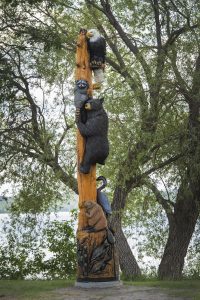 “I feel strongly about doing what the students want to see on campus,” she said. “I am always impressed by our students’ strength. They have a passion and are engaged with outdoor recreation and our environmental behaviors and knowledge.”’
“I feel strongly about doing what the students want to see on campus,” she said. “I am always impressed by our students’ strength. They have a passion and are engaged with outdoor recreation and our environmental behaviors and knowledge.”’
“To me, 10 years of sustainability signifies the continuation of foundational work completed by many individuals who established a legacy of higher environmental standards at Bemidji State.” Jordan Lutz, BSU sustainability project manager
As the Sustainability Office looks forward to its next 10 years, its priorities will include a university carbon-neutrality plan, investments in sustainable landscaping and community garden spaces, energy efficiency upgrades and potential alternative energy sources for the campus, improvements at BSU’s Hobson Forest, and supporting the university’s environmental studies programs.
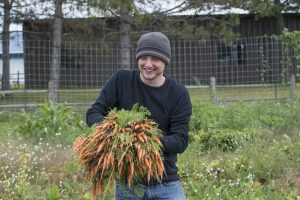
on-campus community garden.
In particular, the Sustainability Office will continue its work to develop Niizhoo-gwayakochigewin, an academic program which will demonstrate western concepts of sustainability and environmental responsibility through a traditional lens of indigenous knowledge. The program, named for an Ojibwe phrase meaning “two ways of making things right,” will offer opportunities for students to earn a degree or pursue a minor in indigenous sustainability studies.
Bailey-Johnson, who co-directs Niizhoo-gwayakochigewin in addition to her role as director of sustainability, says the academic program and Sustainability Office initiatives illustrate the broad vision that Bemidji State University has for sustainability.
“I’d like to show others that sustainability is more than just facilities, more than turning off the lights and saving energy,” she said. “It’s about how we understand, honor and take care of the Earth. I’m excited about all the ways we are connecting indigenous studies to sustainability issues on campus.”
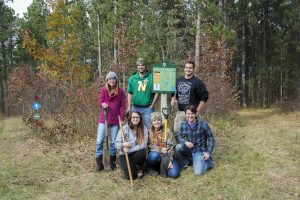
Bemidji State reinforced its ongoing commitment to climate leadership in April, when President Faith C. Hensrud signed the Second Nature Climate Commitment during the Sustainability Office’s annual Feast of Green celebration. The commitment builds on the organization’s Carbon Commitment, a pledge by colleges and universities nationwide to be carbon-neutral by 2050 which was signed by former BSU President Dr. Jon E. Quistgaard in 2008 and reaffirmed by Hensrud in 2017. As a Climate Commitment signatory, the university will integrate its carbon-neutrality initiatives with activities that emphasize climate resilience and community engagement.
“The exciting thing about the Climate Commitment is that we, as an institution, have already made great progress toward the Carbon Commitment,” Hensrud said. “I also appreciated the community connection aspect of the resiliency component. When I looked at everything the Climate Commitment entails it was easy to say, ‘this is a program in which Bemidji State University can be a nationwide leader.’”
Lutz says the Climate Commitment provides a solid springboard to help the BSU Sustainability Office begin its second decade of service to the campus and greater Bemidji region. The office will also pursue answers to climate-related questions that will be of increasing importance in the coming years.
“Resilience planning is a holistic endeavor,” he said. “It requires collaboration with community partners to identify vulnerabilities in the face of a changing climate — and to find proactive solutions for those vulnerabilities. As a Sustainability Office and as a university, we will be working hard to identify our strengths and priorities moving forward.”
BY CARISSA MENEFEE, ASSOCIATE DIRECTOR OF COMMUNICATIONS AND MARKETING

